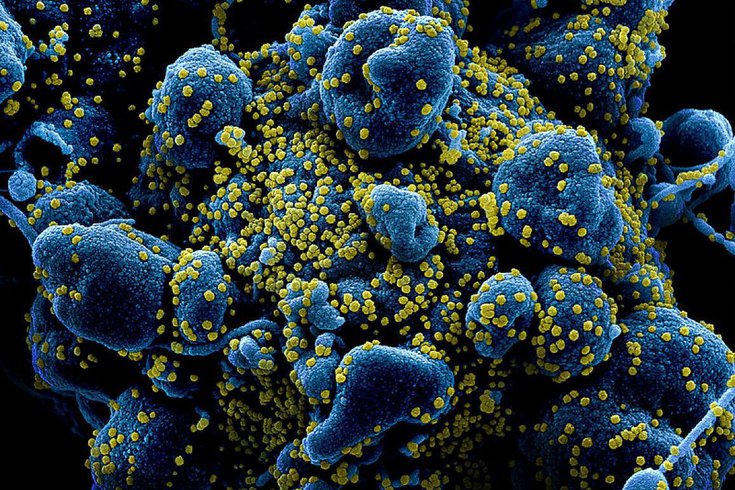
December 28, 2020
 Courtesy of/National Institute of Allergy and Infectious Diseases
Courtesy of/National Institute of Allergy and Infectious Diseases
Data suggests a monoclonal antibody treatment developed by AstraZeneca can neutralize the coronavirus immediately after exposure and offer protection for about a year. Above, an apoptotic cell heavily infected by SARS-CoV-2.
Scientists are exploring whether an injection of donated antibodies can protect against infection after a COVID-19 exposure – or at least prevent severe disease.
Getting inoculated against the coronavirus after an exposure is ineffective because it takes weeks for the vaccine to offer full protection. However, a monoclonal antibody treatment could offer the emergency protection needed in these types of situations.
If effective, this treatment could protect vulnerable populations who haven't yet been vaccinated – or people who can't get inoculated because of health risks, scientists say. It also might help prevent large outbreaks in communities.
The University College London Hospitals NHS Trust in the United Kingdom is conducting a randomized, controlled trial to determine whether antibody donations are an effective COVID-19 treatment.
Volunteers who are exposed to a person with COVID-19 are given an injection of two different antibodies donated from people who are COVID-19 positive.
Ten people enrolled in the study already have been given the experimental antibody injection. The researchers expect to recruit a total of 1,000 volunteers.
Data suggests the monoclonal antibody treatment, developed by AstraZeneca, can neutralize the virus immediately and offer protection for about a year.
Dr. Catherine Houlihan, a virologist with University College London Hospitals, told BBC News that antibody donation has been used post-exposure for other viruses, including to protect women exposed to chickenpox.
The health system also has another trial focused on this antibody treatment – this one involves volunteers who haven't yet been exposed to the coronavirus. These participants have health conditions such as cancer and HIV which weaken the immune system, possibly interfering with the effectiveness of a vaccine.
The researchers hope that the antibody injection will strengthen their immune system enough to prevent infection if they are later exposed to the virus. Results from both trials are expected in the spring.
The United Kingdom has been facing a new mutation of the SARS-CoV-2 virus, dubbed B.1.1.7., which appears to be almost 70% more contagious than the original strain. This mutated strain has begun spreading worldwide, leading other countries to institute new restrictions for U.K. travelers.
The new strain has been detected in The Netherlands, Denmark, Belgium, Iceland and Canada. The U.S. has not confirmed any cases, but health officials say it most likely already is spreading.
Last week, the Centers for Disease Control and Prevention announced new guidance on travel from the U.K. in an effort to curb the spread of this new strain. All passengers on flights coming from the U.K. will need to have a negative COVID-19 test within 72 hours of departure.
It is still unknown whether this mutation will change the effectiveness of the Pfizer and Moderna vaccines. The companies said they are now testing their vaccines against the new strain.